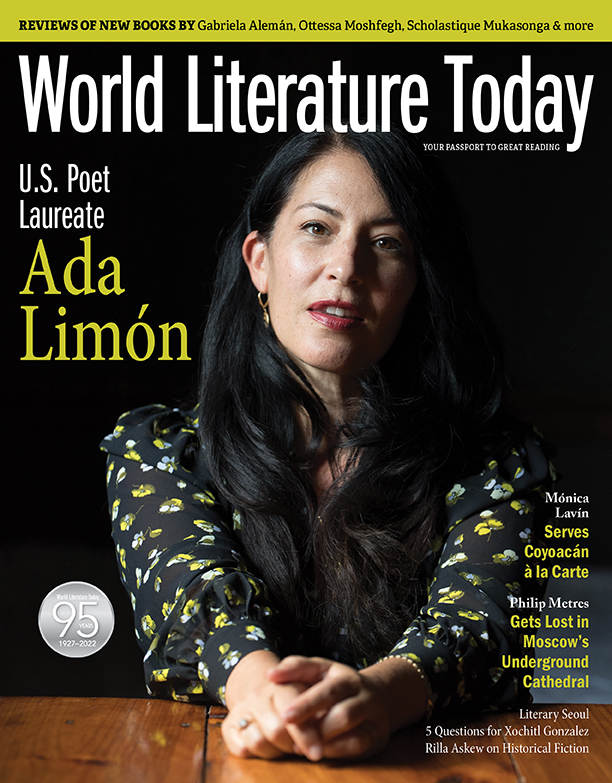Love of Stone

Translator’s note: The following text by Lin Yi-Han, like her novel Fang Si-Chi’s First Love Paradise, is based on the theme of what it’s like to dwell in a body that carries trauma, and what it means to live in a mind where literature, memories, and vulnerability interweave with one another. Lin’s language is unique and devastatingly beautiful. Her language and metaphors are rich in lyrical tradition, from the Chinese classics, chengyu expressions, and lines of cultural history. Translating Lin’s language is like perusing blood in our veins, feeling that heartbeat against our chests, and letting our emotions flow with our bodies.
As a translator who has spent over three years with Lin Yi-Han’s works, her writings not only brought me closer to topics of gender, of the rights to our bodies, but also to the importance of discussions about mental health. How does our relationship with our minds change over time, especially after trauma? How do we live with the rhythms of our emotions when our bodies remember agony from the past? What kind of change can we bring to our bodies and minds, and what can we talk about with one another, in order to not otherize the journey we have been through with our minds? What does love mean to us, or shape in the need of us, in our paths to find that love, that sense of belonging ever again?
Content warning: The following work references suicidal thoughts and sexual assault.
– Jenna Tang
This was my everyday life: I would walk to the subway station, listen to Tae-yeon’s new album on the train, and then walk to the coffee shop from the station. I always started listening to the first song; like reading a novel without a bookmark, it was as though I’d memorized the first sentence of the book and would never know the ending. I watched the barista wash a pot of Ethiopian coffee beans. What does it mean to wash something? To dry something under the sun? Drifting among the words was satisfactory enough, and there was no need for an answer. Just like my life.
I would first peruse a novel of exactly two hundred pages, no more or less. And then I would listen to Professor Der-wei Wang’s guest lectures on the contemporary Chinese lyrical tradition, recorded in 2015 at Taiwan National University. One of the two-hour classes took me four to five hours to finish; I paused and listened to every scrap of it, slowly writing down line by line. I piously jotted down almost every sentence. After that I would take a shower back home, pumping out shower gel for my lower body, another pump for my upper body. The bottle and its ducklike pump looked obedient.
I went to my doctor’s appointment every Wednesday, and on the way I would see two rows of carmine azaleas spewing out along the path toward the hospital. One time, as I sat in the long row at the coffee shop, I was approached by a little boy in a superhero suit. His young mother apologized to me, but I thought, I’m the one who should be sorry—he almost contracted my mental illness. As I waited for the subway, my bag was full of books and notebooks as well as my laptop. I held on firmly to the soft and fragrant handle of my bag, as though it were a rail of hard stone, so that I wouldn’t jump down onto the track.
My friend Meimei had started her fifth year in college. She was struggling to complete her last two credits. Once she told me glumly that she had inquired about graduation several times, but the school kept responding, “You have applied for an early graduation, but you have deferred two semesters, so lacking two registration stamps, you’ll have to complete an extra year.” I said fuck, and we said this was like what we’d seen in that movie, about a homeless elder who was trying to apply for retirement benefits from the government but got fucked over by the system.
I was in so much pain. She and I were so different: she still believed in humanity. Unlike me, she hadn’t dropped out of school. Whenever we said goodbye to each other after meeting up, I would hug her tight. She was so tiny that her soft, short hair would squeeze between my breasts when we embraced; our hair would flow together until I didn’t know which strands belonged to whom. As I hugged her, I felt her supporting my body. Every time Meimei asked to meet I would always say yes, desperate to see her. I didn’t know when they would send me to the psychiatric hospital again, or for how long. I was twenty the second time I lived in a psychiatric hospital, and I had brought a stack of books one meter high. Even after I read all of them, it still wasn’t time for me to check out of the hospital, so I could only read them all over again. Maybe someday I would just kill myself.
She and I were so different: she still believed in humanity.
ON THE DAY of my breakdown, I stayed over at Meimei’s place. In a rush, I forgot to bring my medication, so I simply stared at her medicine basket. “Even though I’m on Zopiclone, could you lend me two Stilnox?” We laughed out loud at how persistent I sounded. Without the proper medication, I cried in trembling fits all night long. I could hear Meimei tossing and turning in her thin blanket, pan-frying herself over and over during a very shallow and fragmented sleep. After my eyes adapted to the darkness, I could see all of the DVDs in her room: Edward Yang, Isabelle Huppert, Juliette Binoche, Atom Egoyan, Lars von Trier, Roy Andersson, Ozon, and many others that I couldn’t name. I felt a sudden pain and grief. Meimei had her superstitions, just like the way I hid myself behind books. Most of me was hiding behind physical books. Just then, the debate about “whether art should include any lyrical ornamentation / is art nothing but poetic embellishment” suddenly grabbed me like an overly tight ponytail, pulling my face backward, tighter and tighter until I felt I might disappear entirely.
Speaking of psychotic breakdowns, what we meant was: Other people’s lives are solid lines, but ours are dotted lines, meaning we have not lived our lives fully.
Other people’s lives are solid lines, but ours are dotted lines, meaning we have not lived our lives fully.
I used to say that my mother would surely give me a chastity belt to wear if she could. As for B, it would be reasonable if he gave me a collar or buried a small chip in my neck. The first time I had an interview, he said he would go with me, but then he wavered and said, If you don’t like it, I can simply not go. After he said that, I felt like I couldn’t say no anymore. During the interview, he sat a few seats away at the back of the coffee shop. Once we were out of the café, he said lightly, You were really laughing just a while ago. I felt some kind of hatred at that moment. I hated how I loved him with all my heart, yet for him, he wasn’t even confident in himself, in being with me, nor in our relationship.
After I stopped wearing my wedding ring, people would often approach me. It was as though I’d rediscovered or reinvented myself in the eyes of passersby. And this new appearance of mine, regardless, was only passing by itself. No matter how white the passersby’s teeth were, their eyes were always like two preserved prunes. Invention is all about reinventing what others invented ten years ago. It was nothing but a joke for others to be published in a journal. After listening to the online lectures, I walked from the coffee shop to the subway station, then the subway station to home. On these two paths at night, whenever I walked right underneath a streetlight, a shadow followed; as I walked out of it, my body would be swallowed by the night. Every time a streetlight shone on me, a brand new shadow appeared. My high heels clicked loudly against the pavement. Nighttime in this city was sentimental, the shadows distinctly different from those that followed my steps in the morning. However, that was also the sentimentality of fallen flowers and flowing water, the kind that suited a beautiful and innocent girl like me, sentimentality for someone who was about to be mentally destroyed.
Every time you knocked on my door, your knuckles knocked against my heart through the steel. I wanted to put on my slippers, but the flannel tickled my feet, so I was unable to put them on myself. As I opened the door, my face blushed like an orange falling from the tree, hitting your head, and making you dizzy. The first time you called my name, I went back home and wrote down, “First, Thomas Mann, ‘like a golden ring falling into a silvery bottle.’ Second, Eileen Chang’s ‘In the room, there was a tranquility like golden powder, burying from the golden sand. Outside, the rain was blowing with the wind, and all around the mountains and fields were full of today.’” Whenever I was in deep pain, you would tell me to stop reading Eileen Chang’s “Jasmine Tea” and drink up some real jasmine instead! The truth was, the one who was capable of hurting me was never Eileen Chang, but you.
In those years, I often thought about “taking a leaf out of another person’s book.” Isn’t that the origin of the expression? The legend goes that when the fellow from Handan was trying to learn how to walk, he forgot what it was really like to walk properly and even forgot the way he usually walked, so all he could do was crawl his way back. I think my feelings for Eileen Chang, or you, are like this. I forget how I used to write before I read Eileen Chang, how I lived my life before I met you. And all I can do is crawl my way back.
According to Doctor Chu-Chu, I am someone who has been through a “nuclear explosion.” I have lost the ability to love someone. Before I met B, I’d never fallen in love with any boys I’d been with. I had a lot of secret codes with B: “apple” meant hey, check out that girl; “hamburger” meant let’s get out of this unexpectedly expensive restaurant; “French fries” meant let’s keep our volume down while talking about people sitting at the next table; “meringue soup” meant that my headache was worsening and I needed rest; “shrimp chips” meant some other guy was checking me out and I was feeling uncomfortable. He understood all of my codes. I felt like crying whenever I thought about this. B was truly my first love. I have come to understand the meaning of “flavorless” lately. Even if I pick something especially salty, sour, or spicy to eat, once it’s in my mouth, the food becomes only about the texture, hard or soft. There’s no taste at all. Like marriage, as Hu Lancheng wrote for Wang Jingwei in a collection of editorials, wars are hard to fight, and peace is rare and difficult to reach.
The day I broke down I was in a taxi, about to head to Meimei’s place. I was surprised when the driver tried to talk to me. He said he was over sixty but “still very good at it.” His wife had been dealing with the effects of a stroke for over ten years, so he could “only seek out a Vietnamese girl.” “So coquettish, she would get how to please me just by watching a porn in the hotel.” Do people say that nobody knows how to love anymore? He thought Vietnamese girls knew how to. He had his first love when he was nineteen, and two of his lover’s brothers took off all their clothes to sleep in their beds, so of course he “also stripped himself naked to climb into her bed.” “Hahaha.” “Miss, why are you still crying?” He said women often cried for nothing because of men. How hard was it to get a man? “The Vietnamese girl always called me ‘Big Brother’ in bed.” He would be pleased whenever he heard that. Isn’t that always how it was between men and women?
Of course, I have my legs, and our place was definitely not more than ten thousand square feet, but I always asked B to get some water for me. It was not just 水 (water) but 水水, a diminutive repetition pronounced with pouted lips like blowing kisses. B would arch his back like pulling a bow, take two steps with his big feet, and come back to give me a mug so full of water that I had to lick the surface like a dog. He said pouring less than that would be too stingy. Those two steps that he took signified the best and most vibrant moment of my life.
Those pictograms were so tiny, yet opulent with grief.
I had been thinking about the time when I first started writing my novel. After writing a short paragraph, I showed only B and Meimei. Meimei kept saying it was so good. As for B, he spurted out, “My Yi-Han, she’s about to become everyone’s Yi-Han.” The definition of a psychiatric patient is: No matter who she spends time with, she will never be able to feel happiness. I don’t care about being a beautiful girl, or a rich girl, or a smart girl. The only thing I want is to be able to love properly and to be loved properly. Maybe I’ve always had a tendency for self-destruction. In second grade, I wrote in my workbook: “Every time Mommy hits me, it feels like a huge stone pressing on me, making me want to kill myself.” I wrote the two 口 characters, which contained within them the character for 石 (stone) in exaggerated fashion, making them look full and puffy, so deep and engraved that they were about to break out of the green boxes I was supposed to write in. Those pictograms were so tiny, yet opulent with grief.
Translation from the Chinese
Editorial note: This text, believed to be the final piece that Lin wrote, was submitted to the editor of INK magazine on April 26, 2017, one day before her passing.












